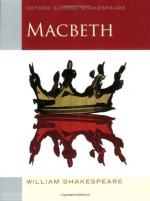|
This section contains 612 words (approx. 3 pages at 300 words per page) |

|
Equivocation in "Macbeth"
The novel Macbeth is full of equivocation and as a whole has double meanings. This is to make the novel more appealing and interesting because of all the betrayals and treachery. Shakespeare has Macbeth, the witches, and other insignificant characters use equivocation in their actions and words to emphasize the theme of duplicity in this tale of lies and murder.
Macbeth as the main character has a duel personality and has a way of equivocating what he says. In Act 2, scene 1 Macbeth is asked by Banquo if he has thought of the three witches and Macbeth tells him "I think of them not." In a way this is true because Macbeth is actually thinking about killing Duncan. But, Macbeth has to kill Duncan to become king, which is part of the witches' prophecy and if done will make it come true. Also, in Act 2, scene 3 after killing the...
|
This section contains 612 words (approx. 3 pages at 300 words per page) |

|


